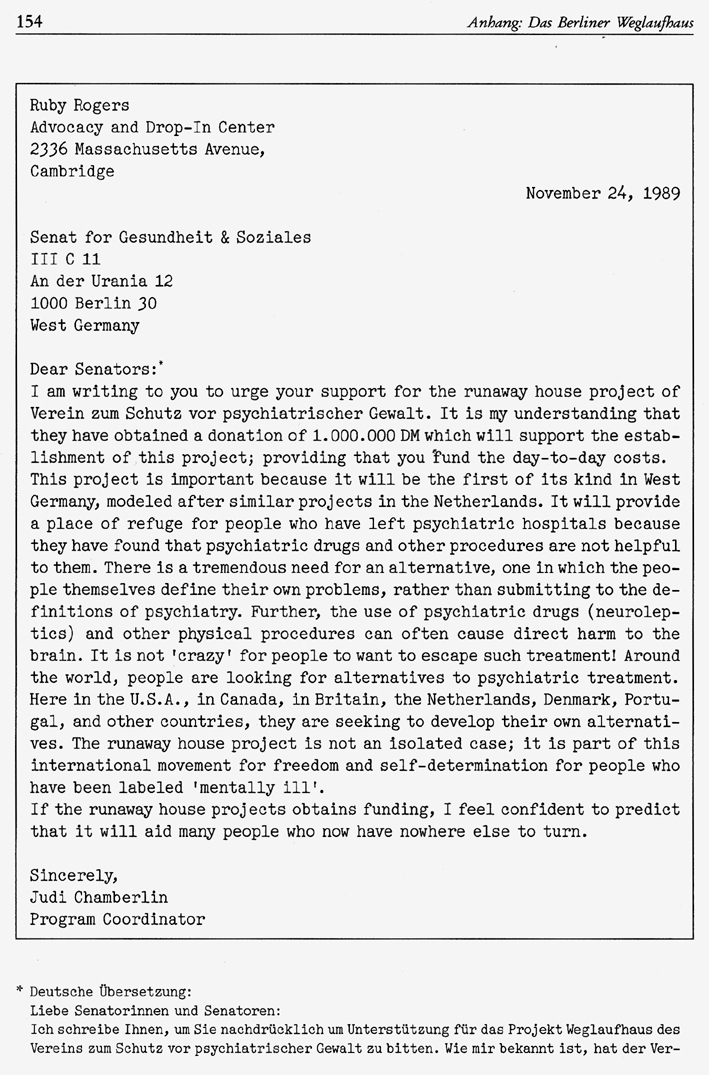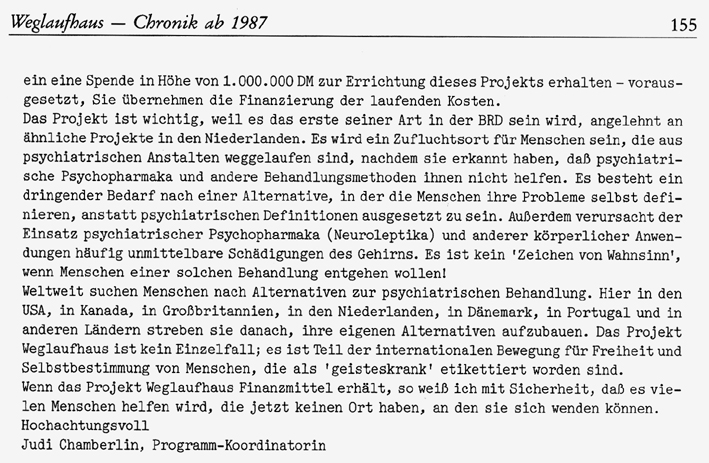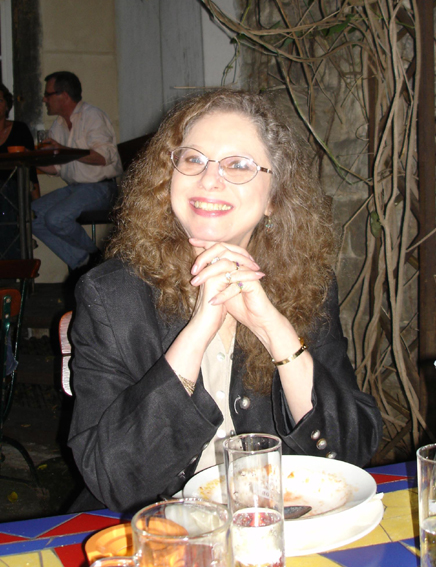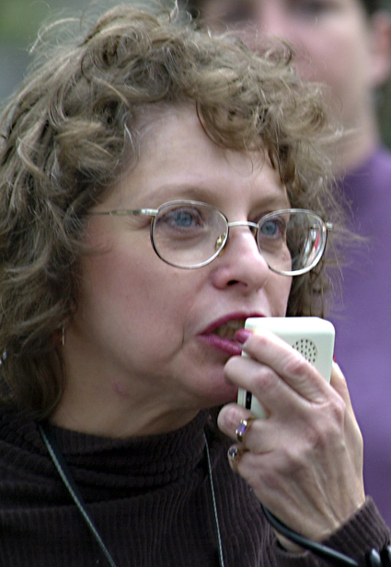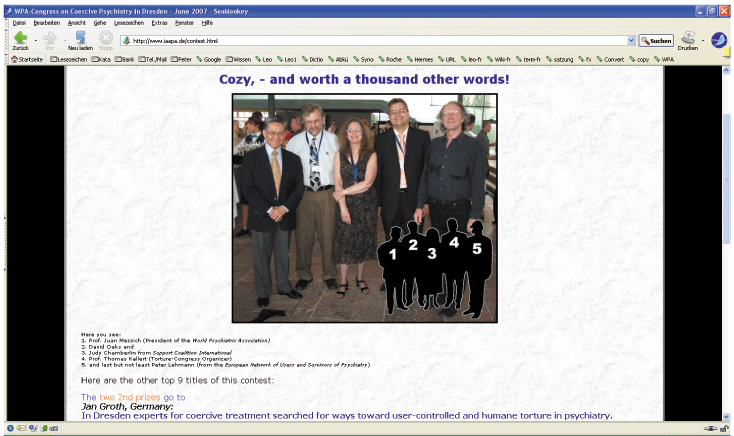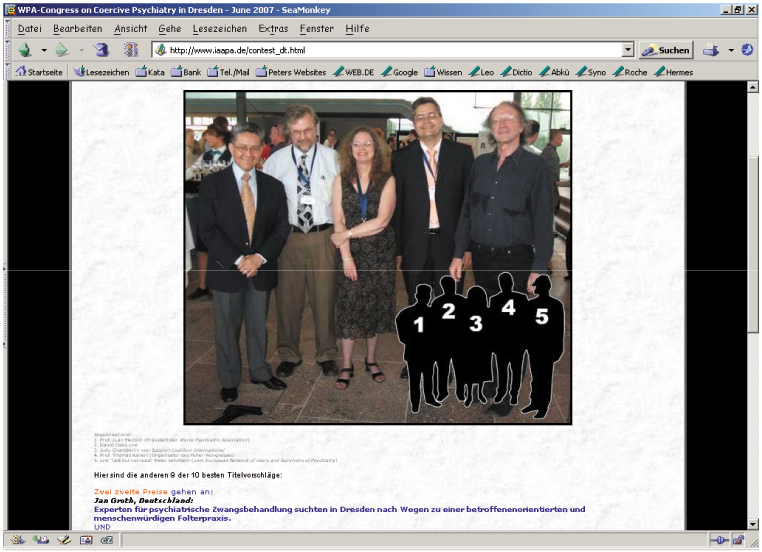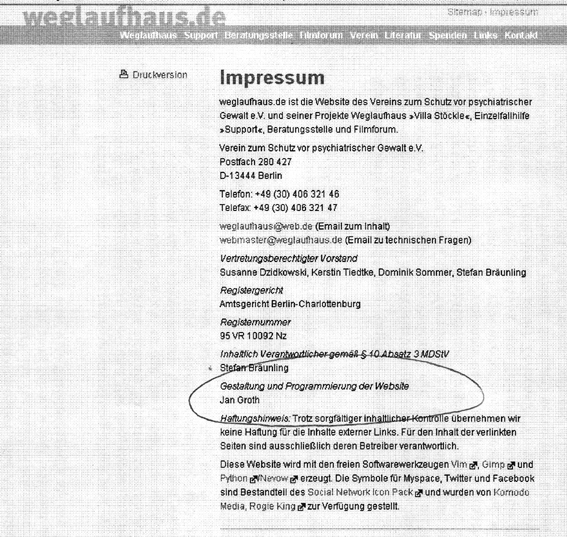|
Whose Defamation? Whose Insult? Whose Shame?About the indifference of the Berlin Runaway House organisation towards its staff-member Jan Groth's cybermobbing and defamation of Judi ChamberlinThis paper highlights the defamation of some fighters for human rights by a small dogmatic group, especially the webmaster of the Berlin Runaway House. The example shows how destructive it will be in the long run to stay absolutely indifferent against the defamation of survivors of psychiatry, who supported the founding of the own antipsychiatric Runaway House in a meaningful way. When public defamation comes from people connected with the own organisation, staying silent publicly will undermine the own credibility. Denying solidarity with attacked supporters might only produce isolation, which will be dangerous for the project in future situations where others are asked for support. In 1989, Judi Chamberlin was one of the first international human rights activists who supported the Berlin Runaway House group. This group (called: Association for the protection against psychiatric violence) had started in the early 80s of the last century to plan a shelter for people who escape from psychiatric violence and to find supporters for their struggle. In Germany, Judi Chamberlin joined not only the Advisory board of this organisation, but also demanded support from the Berlin Senat für Gesundheit & Soziales (Senate for Health & Social Affairs) for the planed Runaway House. See her letter below (published in Uta Wehde's book "Das Weglaufhaus – Zufluchtsort für Psychiatrie-Betroffene" (Berlin: Antipsychiatrieverlag 1991; English information about this book find at www.peter-lehmann-publishing.com/books/wehde-e.htm).
Sadly, Judi Chamberlin died on 16 January 2010 at age 65. She was widely considered a grandmother of the mad movement: author, leader, activist, psychiatric survivor. Find information about her on https://mindfreedom.org/about-mfi/mfi-board-info/judi-chamberlin
In June 2007, two and a half year before Judi Chamberlin died, she participated at the congress "Coercive Treatment in Psychiatry: A Comprehensive Review", run by the World Psychiatric Association in Dresden, Germany. In 2006, the action project against Harassment and Discrimination Faced by People with Mental Health Problems in the Field of Health Services, organized in the framework of the "Community Action Programme to Combat Discrimination in 2001-2006" with support from the European Union, a transnational study within this program, was finished. It has been designed and conducted by associations of (ex-) users and survivors of psychiatry and their families from the U.K., Austria, Germany, Spain, the Netherlands and France in conjunction with a Belgian research institute, Mental Health Europe and the European Network of (ex-) Users and Survivors of Psychiatry (ENUSP). One of many proposed measures to combat discrimination was the policy recommendation of effective representation of (ex-) users and survivors of psychiatry or user/survivor workers in crisis centres, counselling centres, public relations work, research projects, congresses, networking and international exchange of organisations representing (ex-) users and survivors of psychiatry. According to these recommendations, Thomas Kallert as Chair of the WPA congress organizing commitee had invited ENUSP, WNUSP and MindFreedom International to participate at the congress and offered two users/survivor-controlled symposia (with 10 people alltogether incl. costs-reimbursement) two keynote lectures for user/survivors of psychiatry, free information stands for their organisations, participation at the press-conference of their delegates, participation in the scientific and organizing congress committee, distribution of their information sheets via the congress folder and reduced fees for other participating user/survivors of psychiatry (see the report about the agreement in English.and in German). On this basis ENUSP and MindFreedom had decided to participate at the congress; for unknown reasons WNUSP was not able to make a decision about the participation, and only a very small group of some people around the German Rene Talbot (see the documents No. 1, No. 2 , No. 3 and No. 4 [all in the German language] about Talbot's friends' attempts of defamation in the run-up to the negotiations about a congress-participation), decided to stay outside the congress and to demand the abolishment of coercive treatment outside. The big democratic organisations of users and survivors of psychiatry and their supporters like MindFreedom International demand the abolishment of coercive treatment inside the congress. Beside Judi Chamberlin, other courageous speakers at this conference were the second keynote lecturer Dorothea Buck, survivor of the forced psychiatric sterilization during Nazi regime in Germany, the Chairwoman Mary Nettle from the ENUSP and Robert Whitaker, author of "Mad in America: Bad Science, Bad Medicine and the Enduring Mistreatment of the Mentally Ill". Judi Chamberlin used the invitation to the congress to demand the abolishment of forced treatment in her keynote lecture "Whose Voice? Whose Choice? Whose Power?" Her lecture was videotaped and can be downloaded from http://ki-art-multimedia.de/dresden/judi.htm, like many other documents and photos, see http://ki-art-multimedia.de/dresden/dresden.htm. Beside this, Judi Chamberlin was also one of the key persons who formulated the Declaration of Dresden Against Coerced Psychiatric Treatment, signed by herself together with Peter Lehmann in the name of ENUSP, the World Network of Users and Survivors of Psychiatry and MindFreedom International. In 2007 / 2008, shamefully Jan Groth, Germany, used one of the photos from the Dresden conference (see the screenshot below) defame Judi Chamberlin – beside the two human-rights-activists David Oaks, like Judi Chamberlin also former member the Runaway House Advisory board, and Peter Lehmann, founding member of the Runaway House – as "expert for coercive treatment", who searched in Dresden "for ways toward user-controlled and humane torture in psychiatry". See www.iaapa.de/contest.html in English and www.iaapa.de/contest_dt.html in German. User-controll and human torture of course wourd be classical oxymoron, a contradiction in itself. But neither Judi Chamberlin, Peter Lehmann and David Oaks demanded such an idiotism (and even Thomas Kallert and Juan Mezzich were not so bizarre to combine coercive treatment with user-control), nor were or are they idiots to belief in such a nonsense, which of course would be an insult to all users and survivors of psychiatry. Ignoring the fact that all above mentioned survivors of psychiatry demanded the abolishment of coercive psychiatry, Jan Groth and friends took the simple fact of congress participation per so to defame them as advocates of psychiatric torture. See below the defamation by Jan Groth:
On the internet you can find out the place of activity of Jan Groth: the Berlin Runaway House organisation. Years later after his defamation, still in July 2010, you can identify him as webmaster of the Weglaufhaus (the German term for Runaway House) Berlin – see below:
Shamefully, until today (July 13, 2010) the Berlin Runaway House organisation denies any public alienation from their perennial webmaster Jan Groth, who obviously stopped his webmaster-activity for the Runaway House in spring 2010, by simply repeating to say that they "have no means of telling him what to say", that "at the time of the Dresden conference, he was not employed by the association, but doing voluntary work", that "he is webmaster of our homepage without responsibility for the content". They are not even able to delete the links to the organisations which carry the defamation or to stop the collaboration with people like Rene Talbot, Germany, who – with the same level of emotional and political intelligence – share or triggered the defamation. [Same with George Ebert; he – sitting at home in USA in front of his computer screen – obviously means it is a) cozy, snug and comfortable to protest against human rights violations within a psychiatrists' congress in Germany and b) disrespectul to call his insult "disrespect".] Facing the nonchalance of the Berlin Runaway House organisation towards the defamation of former supporters of the Runaway House by its webmaster, only sadness remains. Even when I, the author of this paper, left the Berlin Runaway House organisation in 2001 and have never met Jan Groth, full of shame I now have to beg pardon from all still living people whom I have asked in former years to support the Berlin Runaway House and who now might also feel defamed or insulted. Sorry, I did not succeed to convince the Berlin Runaway House organisation to alienate publicly from its webmaster's defamation and to ask publicly for pardon. I do not have enough measures against human indifference. No question, the Berlin Runaway House is extreme important as one of the very few working alternatives beyond psychiatry (see the article "Finding common strength together: The Berlin Runaway House" by Petra Hartmann & Stefan Bräunling (in the book "Alternatives Beyond Psychiatry", edited by Peter Stastny & Peter Lehmann, Berlin / Eugene / Shrewsbury 2007, pp. 188-199; e-book in 2022). Altogether,
defamation of them and indifference by the organisation which runs the Runaway House towards their defamation are of extreme danger for its credit, which is the basis to maintain supporters or find new ones. According to its own publications, see for example the Runaway House' cry for financial support in the ENUSP Newsletter Advocacy Update – The latest in activism and community news from ENUSP, Vol. 1 (2010), No. 1, pp. 32-33, you can only wonder about the political purblindness of its current leaders. Indifference and insults only frighten people off joining the fight for the required change of the psychiatric system and the struggle for human rights and social justice for people affected by the psychiatric system. Copyright by Peter Lehmann 2010. All rights reserved |
